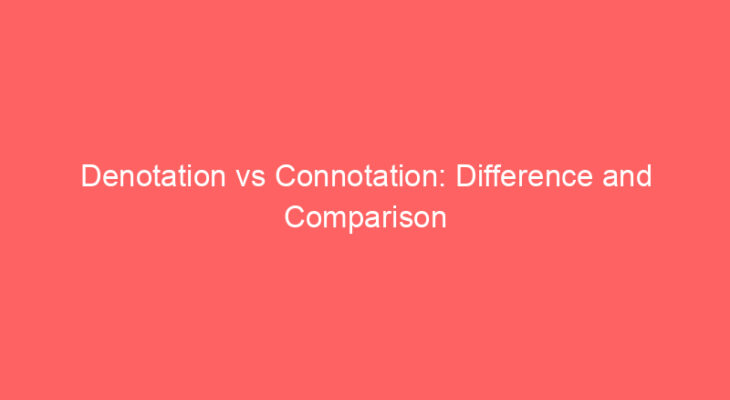Key Takeaways
- Denotation refers to the primary or literal meaning of a word or expression.
- Connotation refers to the additional or implied meanings and associations that words carry beyond their denotative definitions.
- Denotation represents a word’s common or widely accepted meaning, making it the basis for shared understanding. At the same time, connotation reflects personal interpretations and emotional responses to words, making it highly individualistic.
What is Denotation?
Denotation refers to the primary or literal meaning or expression. Most people would agree with the straightforward dictionary definition of a word. Denotative meanings are objective and concrete, making them essential for effective communication.
In literature and communication, denotation is a baseline for understanding, ensuring people can comprehend each other’s messages without ambiguity. It forms the foundation upon which more complex and nuanced layers of meaning can be built.
To understand denotation, take the example of a rose. Its denotative meaning is a flowering plant with colourful petals and a pleasant fragrance. This definition remains consistent across various contexts and cultures, making denotation a crucial tool for clarity and precision in language.
What is Connotation?
Connotation refers to the additional or implied meanings and associations that words carry beyond their denotative definitions. These associations can be emotional, cultural, or subjective and vary from person to person. Connotations can be positive, negative, or neutral, adding depth and richness to language.
Connotation adds colour and depth to language. Authors and poets use connotation to infuse their writing with layers of meaning, creating vivid and evocative imagery. Selecting words with specific connotations can elicit emotional responses and engage readers deeply.
Connotations can influence how we perceive and respond to words. For example- consider the word home. Its denotation is a place where one lives. However, its connotations can vary greatly. For some, it might evoke feelings of warmth, safety and comfort, while for others, it might bring up feelings of confinement or loneliness.
Difference Between Denotation and Connotation
- Denotation refers to a word’s literal, primary meaning as found in dictionaries and agreed upon by most people. At the same time, connotation, on the other hand, encompasses the additional, emotional or subjective meanings and associations that words carry beyond their denotative definitions.
- Denotation is objective and consistent across different contexts and cultures, providing a stable foundation for clear communication. At the same time, connotations are subjective and vary from person to person, influenced by personal experiences, cultural factors, and individual perceptions.
- Denotation is essential for clarity in communication, ensuring that words have a shared, precise meaning. At the same time, connotation adds depth and richness to language, making it more expensive by bringing in emotional and nuanced associations.
- Denotation deals with words’ literal or factual meaning, making it crucial for conveying straightforward information. At the same time, connotation involves symbolic or metaphorical sense, allowing for more creative and expressive communication.
- Denotation represents a word’s common or widely accepted meaning, making it the basis for shared understanding. At the same time, connotation reflects personal interpretations and emotional responses to words, making it highly individualistic.
Comparison Between Denotation and Connotation
| Parameters | Denotation | Connotation |
|---|---|---|
| Definition | Literal or historical meaning found in the dictionary | Emotional or subjective meaning that carries beyond denotative meaning |
| Objective vs Subjective | Objective and remains consistent across cultures | Subjective and varies from person to person |
| Clarity vs Depth | Clarity in communication | Depth and richness of language |
| Literal vs Figurative | Literal or factual meaning of words | Figurative or metaphorical language |
| Common vs Personal | The standard or widely accepted meaning of a word | Personal interpretations and emotional response to words |




